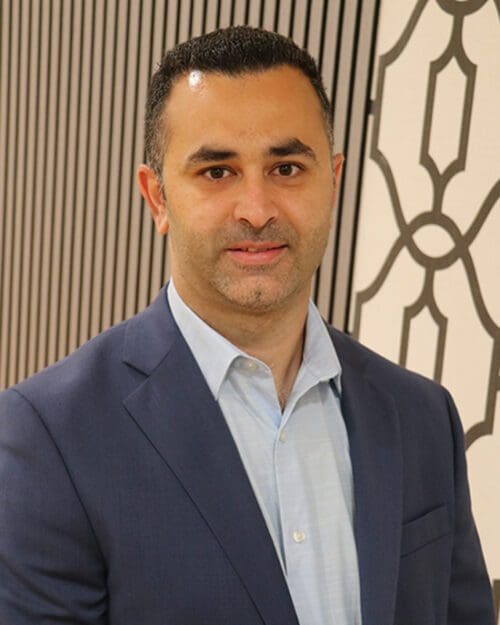Lionhearted Leaders: Khair Al Shamaileh

PNW’s Lionhearted Leaders are faculty recognized for their exceptional work inside and outside the classroom.
Meet Khair Al Shamaileh, associate professor of Electrical Engineering and a Lionhearted Leader in the School of Engineering.
What are one or two of your proudest professional accomplishments?
I have many professional accomplishments to be proud of. One such accomplishment is receiving promotion to the associate professor rank in 2022 after a long journey of hard work. In this journey, I worked tirelessly to improve my teaching, research, and community engagement.
PNW’s conductive environment has always been accommodating by facilitating workshops, training activities, and resources that have significantly contributed to the growth of my career as an educator and scholar in my field. This very nomination as a Lionhearted Leader sets an example, among many, of the encouragement that I receive from PNW, which I will always keep close to my heart. I also find it paramount to give credit to the network of fellow colleagues who showed nothing but support, guidance and care on all fronts since joining PNW in 2016.
Another professional accomplishment I feel proud of is being able to expand my research to cover the domains of cybersecurity and artificial intelligence. Being a telecommunication engineer by education and practice, I found it challenging to do so. Yet, I went the extra mile and aligned my research to these domains for their grave importance to the US national interest.
As a result of this expansion, I received funding support from the National Science Foundation to grow my research that explores the impacts of cyberattacks and devises detection and countermeasure solutions with applications to unmanned aerial vehicles. This generous funding allowed me to encounter and overcome many research dilemmas, work with pioneers in such domains, and train PNW students to be ready for future avenues entailing cybersecurity and artificial intelligence.
How do you stress the importance of detecting cybersecurity attacks to your students?
In this era of massive interconnectivity, cybersecurity becomes one of the biggest challenges that irritate individuals and corporates alike. For example, cyberattacks on unmanned aerial vehicle networks potentially lead to endangering private and public properties, compromising the payload, and accessing sensitive technologies.
I always emphasize to my students how feasible it is nowadays to launch such disruptive cyberattacks, especially with the presence of open-access software and hardware tools. This emphasis is mainly for establishing the motive for them to begin their research in the field of cybersecurity.
I mentor my students in creating realistic cyberattack scenarios and evaluating their impacts. I also supervise their research that entails applying the concept of artificial intelligence, i.e., machine learning, for detecting these attacks. On a parallel track, I put a heavy emphasis on teaching my students to report findings and institute a comparative analysis based on scientific criticisms of the current state-of-the-art cyberattack detection and mitigation approaches.
I always find it entertaining to bring my students to a level where they become more knowledgeable in this field than myself, and crown their efforts with technical publications in journals and conference proceedings.
What do you like to do outside of work?
Outside of work, I enjoy gardening and growing vegetables. I start all my plants from seeds and watch them grow from small seedlings to mature and productive plants. I also enjoy playing video games with my eight years old son (and losing to him).